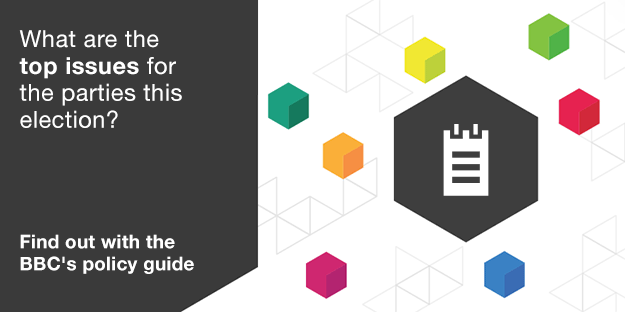Northern Ireland passions move centre stage
- Published
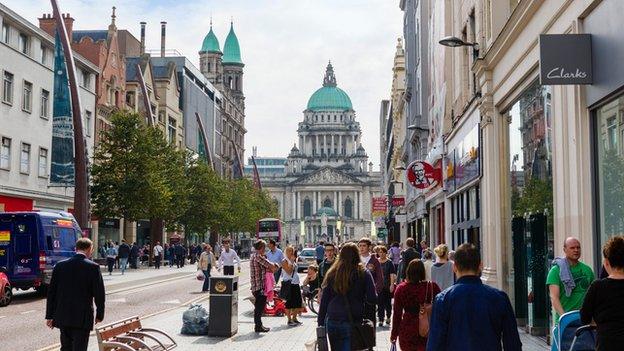
The result in Belfast could have huge importance to the UK
In Northern Ireland there are still bitter arguments about the old issues which divide this part of the world, about the flying of flags and the routes of parades.
It can seem very removed from the politics of the rest of the UK.
They don't even send MPs from any of the main UK-wide parties to Westminster.
But in this General Election the ancient fears and passions of Northern Ireland are echoed in paler colours in the rest of the UK.
Moreover, MPs from Northern Ireland could decide who becomes Prime Minister.
I am reflecting on this new-found relevance, as the black taxi I am travelling in pulls up by a black Belfast wall filled with blurry photographs of men and women.
Underneath each one is a word, printed in red: "Murdered".
The driver and guide Terry, tells me it is the Falls Road's "collusion wall", external.
Union under threat
Terry, a former prisoner, is a passionate republican, and he reflects gleefully on the way the Union is heading, across the Irish Sea.
He says that with nearly half of Scotland voting for independence, it will happen eventually there, and in Wales too.
He predicts that then the Cornish and people in Devon will want their own country.
He adds that England is also divided and Hadrian's Wall will have to be moved to separate the north from the south.
The vision he contemplates with satisfaction is a nightmare to others.
The passions behind the violent times recorded on the walls of Belfast may strike a new chord with the rest of us.
The question of national identity - the desire to leave the Union on one hand, and to stay on the other - once seemed almost alien concerns to the rest of the country.
Now, stripped of violence, and painted in pastels, these are the contemporary puzzles at the heart of British politics.
The continued rise of the SNP despite the loss of the referendum, the talk of English votes for English laws and the increased support for the UK Independence Party are all about geographical identity, external.
Recalibration ahead
The leader of the Ulster Unionists, Mike Nesbitt, recognises the difficulties ahead.
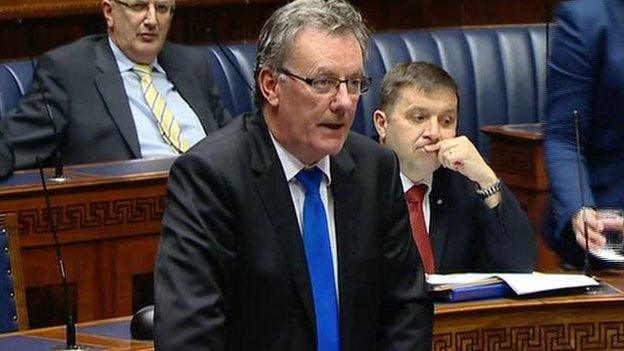
Mr Nesbitt hopes to profit from a hung parliament
"The Union is changing. The Scottish referendum did not lead to independence, but that was the battle, not the war.
"There will be a recalibration of the Union and we feel very passionately about being good corporate citizens of the UK, that it is not a one-way street.
"We see a big picture here unlike some other unionist parties who simply see an opportunity to name a price for political support, and that seems to me a pretty base way to approach 7 May."
That is a dig at their far more successful rivals, the DUP.
It is the Democratic Unionists who are making a blatant bid to be king-makers in a hung Parliament.
They have eight seats at the moment and hope to increase their tally.
Their main election poster shows the Houses of Parliament with the slogan "more votes, more seats, more influence, more for Northern Ireland".
Hung parliament
They have published a document called the Northern Ireland Plan, detailing their demands in a hung parliament.
Northern Ireland's first minister and party leader Peter Robinson tells me we are likely to see more hung parliaments in the future.
"If we are to believe the pollsters and the pundits and the bookmakers, there is going to be a hung parliament. I think the shredding of votes in the UK would suggest that may be the reality for many years to come."
He says they wouldn't take part in a coalition
"We wouldn't take any place in government, but we would, by confidence and supply, give support to a government which was capable of delivering what we require out of that Plan.

Peter Robinson said his party would try to secure the best deal for Northern Ireland
"It is not a pumped up vision of the DUP being the tail that is going to wag the dog.
"We recognise we would be a small party in the overall scheme of things - we are not inflated by any view of our importance."
Among their demands are 2% spending on defence, getting rid of the bedroom tax, and an EU referendum.
Competing offers from Labour and the Conservatives would be judged by which is most capable of delivering on those demands.
Open mind
You might think that the SDLP, currently with three MPs, wouldn't be in this same luxurious position.
They nearly always vote with Labour, but leader Alasdair McDonnell is attempting to give the impression that his mind is open.
"We will be having discussions with Labour and while we might have a tilt in that direction, Ed Miliband should not take us for granted.
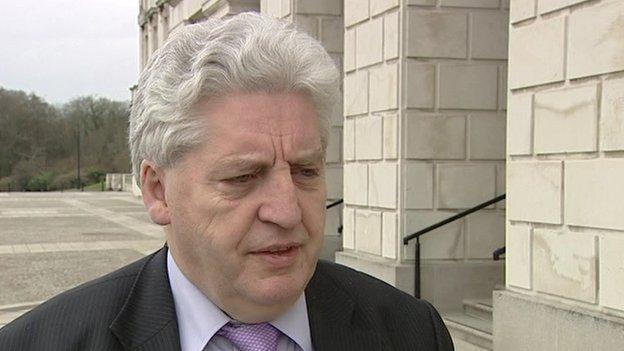
Alasdair McDonnell warned Ed Miliband not to take his support for granted
"I couldn't see any circumstances in which we would support the Conservative Government because they have not treated us well here.
"But we may not vote for either. We are quite free to opt out, quite free to vote against both."
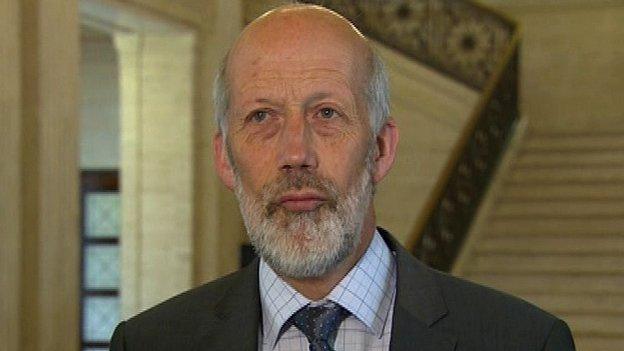
David Ford says cuts are a key issue
"I am not going to commit to what we are going to do on 8, 9 or 19 May - we have an affinity with Labour, but we're not chained to Labour, we don't have leg irons on us."
The Alliance has one MP at the moment, and is under pressure from the DUP.
Leader David Ford doesn't see much to choose between the main Westminster parties.
"What we've seen over the years is a tri-party position on Northern Ireland so I don't know it matters that much in that sense.
"There certainly will be an issue around the level of cuts - the reality is that within Northern Ireland we have very little choice but to accept what comes from Westminster, and cope with it in Northern Ireland.
"We need the money we get but we also need to aspire to grow our own economy and not continually sit with the begging bowl out for the Treasury."
Little austerity
The background to this is that austerity hasn't happened to the same degree in Northern Ireland.
Peace may not be such a fragile bloom now but it has been sheltered from the harsher winds that have blown elsewhere.
The politicians in the Northern Ireland Assembly simply refused to make the cuts.
Government spending really matters a lot in Northern Ireland - the public sector accounts for about 70% of the region's GDP, and 30% of the workforce is employed by the public sector.
Now cuts are coming - £160m off the budget next year - with a warning that it could be slashed by more than £1bn in the years to come.
While the fierce argument over money could be a critical question in any deal, Sinn Féin, currently with five MPs, won't be using any influence they might have in a hung parliament.
Sinn Féin candidate Former Lord Mayor of Belfast Máirtín Ó Muilleoir repeats they will remain an abstentionist party - they don't take their seats at Westminster.

Máirtín Ó Muilleoir says Scottish nationalism has forced a re-think about the UK
I ask if that isn't rather an old-fashioned attitude when they are part of the government of Northern Ireland - don't they want to influence the people who give them the money?
"They don't give us the money. Since 2010 our friends in London have cut the block grant by £1.5bn and that has led to all types of misery and cutbacks and much grief.
"The issue for me is, as a representative at Westminster, can I help build the peace in Northern Ireland - I believe I can do that without going into the chamber."
Change inevitable
He says change is in the air.
"We have all been amazed by the rise of Scottish nationalism and how that has been the major force for reconsidering the make-up of what you refer to as the UK. We have all had to think again.
"One of the lessons of Irish Republicanism over the last 30 years is that politics is the best way forward, that the use of the ballot box, democratic means, can bring about change.
"I think people are voting for that, I think they want a party that will be relentlessly positive, and at the same time will take on these ideologues of austerity in London."
Maybe elections always boil down to the economy, encapsulated in that famous phrase from Bill Clinton's team: "It's the economy, stupid".
But the 2015 General Election is also about concerns in the rest of the country that London and the south-east dominate, worries that others are forgotten and unappreciated, and that the country is changing in unpredictable ways.
It is, depending on your point of view, a vicious or a virtuous cycle.
The more people vote for parties that articulate these worries, particularly geographically-based ones, the more likely it is they will have a say, and change the nature of the Union.
This time some Northern Ireland parties intend to be more than simple spectators.
